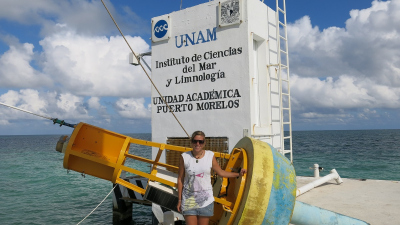Page path:
- Graduate School GLOMAR
- PhD student reports
- Other activities
- Ines Stuhldreier
Ines Stuhldreier
Report of GLOMAR PhD student Ines Stuhldreier about her participation in the postgraduate course "Light and Photosynthesis on Coral Reefs", Puerto Morelos, Mexico, 20 January – 8 February 2014
During the last weeks I got the chance to visit an intensive postgraduate course on the photobiology of coral reefs. The course is held every year at the Unidad Académica de Sistemas Arrecifales in Puerto Morelos, Mexico and provides the students with a) a panorama of the state of knowledge of the physiological and biochemical bases of photosynthesis as well as the mechanisms that regulate photosynthesis in the aquatic environment with particular emphasis on coral reefs and b) technical training in the methods commonly used to estimate primary production.
The course was intense. Three weeks of class and practical training in which experts from different fields shared their knowledge with us. We learned about the physics of light and its distribution in atmosphere and water column from Dr. Eugenio Méndez, Dr. Helmut Maske and Dr. John Hedley. Thank you for not giving up teaching physics to biologists. Following this, Dr. Anastazia Banaszak, Dr. Susana Enríquez, Dr. Roberto Iglesias Prieto and Dr. Ernesto García Mendoza taught us all there is to know about the transfer of light energy to the marine organisms and the biochemical reactions involved in photosynthesis. This complex process changed life on earth by creating an oxidising atmosphere 1 billion years ago and is still the base of the food chain. Future changes in environmental conditions due to climate change will challenge many organisms and lead to shifts in communities depending on their ability of adaptation in photosynthetic efficiency.
A life close to the beach and the opportunity of snorkeling during the lunch break made it durable for us to spend 10 hours in the class room every day. Besides learning everything about the functioning and importance of photosynthesis we were able to conduct field and laboratory measurements to get familiar with the methods and sensors used to measure primary production, for example the Pulse Amplitude Modulation (PAM) Fluorometer. The evenings were filled with seminar talks by the students, a group originating from a diverse cultural as well as scientific background. It was very interesting to get to know what other young researchers of the same field are working on and many of us got useful comments to improve our future research. However, the supervisors did not only provide us with practical information, they also stimulated discussions about ethical aspects of science and encouraged us to more creativity in our future research. Thank you for all the inspiration!!!
Knowledge has been gained and methods applied. Scientific exchange was enriched by stories of personal research experiences. I learned many things I can apply directly during my PhD project and of course for my future career. I got in contact to experts from different fields of coral reef ecology and made friends from all over the world. I am very grateful that GLOMAR made this experience possible for me. Thank you!
The course was intense. Three weeks of class and practical training in which experts from different fields shared their knowledge with us. We learned about the physics of light and its distribution in atmosphere and water column from Dr. Eugenio Méndez, Dr. Helmut Maske and Dr. John Hedley. Thank you for not giving up teaching physics to biologists. Following this, Dr. Anastazia Banaszak, Dr. Susana Enríquez, Dr. Roberto Iglesias Prieto and Dr. Ernesto García Mendoza taught us all there is to know about the transfer of light energy to the marine organisms and the biochemical reactions involved in photosynthesis. This complex process changed life on earth by creating an oxidising atmosphere 1 billion years ago and is still the base of the food chain. Future changes in environmental conditions due to climate change will challenge many organisms and lead to shifts in communities depending on their ability of adaptation in photosynthetic efficiency.
A life close to the beach and the opportunity of snorkeling during the lunch break made it durable for us to spend 10 hours in the class room every day. Besides learning everything about the functioning and importance of photosynthesis we were able to conduct field and laboratory measurements to get familiar with the methods and sensors used to measure primary production, for example the Pulse Amplitude Modulation (PAM) Fluorometer. The evenings were filled with seminar talks by the students, a group originating from a diverse cultural as well as scientific background. It was very interesting to get to know what other young researchers of the same field are working on and many of us got useful comments to improve our future research. However, the supervisors did not only provide us with practical information, they also stimulated discussions about ethical aspects of science and encouraged us to more creativity in our future research. Thank you for all the inspiration!!!
Knowledge has been gained and methods applied. Scientific exchange was enriched by stories of personal research experiences. I learned many things I can apply directly during my PhD project and of course for my future career. I got in contact to experts from different fields of coral reef ecology and made friends from all over the world. I am very grateful that GLOMAR made this experience possible for me. Thank you!



